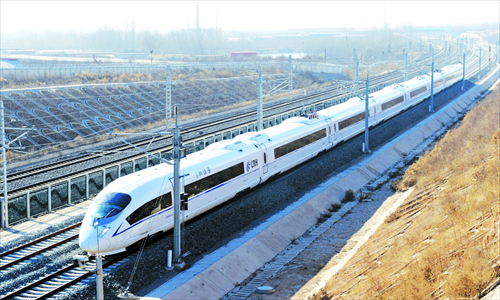China set to unveil reform plan for rail pricing in 2014

A high-speed train runs in Qinhuangdao, North China's Hebei Province. Photo: CFP
China will release its reform plan for the pricing system of railway transportation at the beginning of next year, so as to make the pricing mechanism more market-oriented and attract private investors for railway investment, a media report said Tuesday.
The ticket prices for high-speed rail will possibly float in accordance with passenger flows, the Beijing-based Economic Information Daily newspaper reported, citing sources familiar with the issue.
"The transportation prices for China's railway have been fixed at amounts that are too low for a long time, which makes it less attractive for the private investors to venture into railway investment," a source was quoted by the newspaper as saying.
The now defunct Ministry of Railways (MOR) released guidelines on May 2012 to encourage private investors to invest in railways construction.
Currently, the ticket prices for both high-speed railways and ordinary passenger railways are fixed at a certain level with no fluctuation, meaning prices are the same during rush hours and off-peak hours as well as throughout the year.
For ordinary passenger railway transportation, the government will offer subsidies to offset their losses, the report said.
In China, passenger rail has been suffering losses for a long time, according to Zhao Jian, a professor at Beijing Jiaotong University.
"The reform for the pricing system of railway transportation could reduce losses for the China Railway Corporation (CRC) [the body that was spun-off from the former MOR] to some extent," Zhao told the Global Times Tuesday.
"A floating pricing system could avoid a waste of railway resources," Sun Zhang, a professor of Institute of Railways and Urban Mass Transit at Tongji University in Shanghai, told the Global Times Tuesday.
The Beijing-Shanghai high-speed railway has continuously had a high vacancy rate after it was launched in 2011, especially during off-peak hours, while trains traveling at a lower speed still enjoy good sales due to lower prices, according to media reports.
For cargo transport, prices will be raised to 0.15 yuan ($0.02) per ton for each kilometer from the current 0.12 yuan per ton each kilometer, according to the newspaper report.
"It will take some time to see whether the price rise for cargo transportation will lead to declines in market shares for the cargo railway transportation," Sun said.
The total volume of cargo transportation for China's railways has seen a negative growth since last August, according to data of the then-MOR, despite the market share of other types of transportation and logistics market having seen a fast growth.
To reverse the poor business performance, the CRC announced in June a batch of reform measures including the launch of an express freight service so as to better compete in the logistics market.
Cargo can be delivered door-to-door through its express freight service starting June 15, enabling clients to have cargo picked up at their door either by making orders online or by calling the company's customer service number, instead of going through the previously lengthy procedures, according to the CRC.
Sun noted that it is more reasonable to raise cargo transportation prices in some provinces rich in coal and oil like North China's Shanxi Province, where the cargo transportation capacity is insufficient.